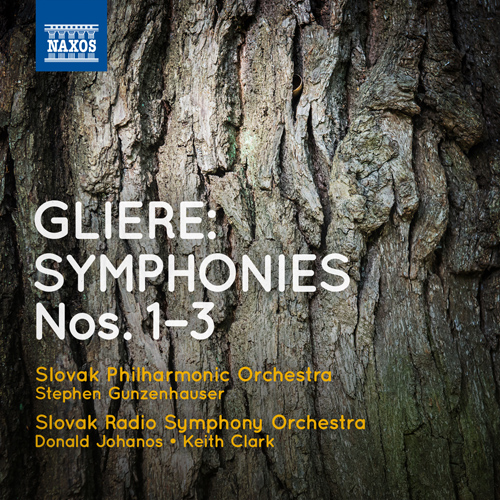Exclusively available on streaming and downloading. Also available on individual CDs.
GLIÈRE, R.: Symphonies Nos. 1-3 (Slovak Radio Symphony, Slovak Philharmonic, Clark, Gunzenhauser, Johanos)
Tracklist
Gunzenhauser, Stephen (Conductor)
Gunzenhauser, Stephen (Conductor)
Gunzenhauser, Stephen (Conductor)
Gunzenhauser, Stephen (Conductor)
Gunzenhauser, Stephen (Conductor)
Gunzenhauser, Stephen (Conductor)
Gunzenhauser, Stephen (Conductor)
Clark, Keith (Conductor)
Clark, Keith (Conductor)
Clark, Keith (Conductor)
Clark, Keith (Conductor)
Clark, Keith (Conductor)
Clark, Keith (Conductor)
Clark, Keith (Conductor)
Johanos, Donald (Conductor)
Johanos, Donald (Conductor)
Johanos, Donald (Conductor)
Johanos, Donald (Conductor)
Johanos, Donald (Conductor)
The Slovak Radio Symphony Orchestra was established in 1929 as the first professional symphony orchestra in Slovakia. The orchestra is currently led by conductor Ondrej Lenárd.
It has made a large number of recordings for labels including Opus, Supraphon, Naxos and Marco Polo.
In addition to regular season concerts, which feature works by Slovak composers, many of them as premieres, the orchestra has performed at concerts abroad, visiting Austria and Hungary, and touring in Europe, Japan and Korea. The orchestra has collaborated with renowned conductors such as Ľudovít Rajter, Ondrej Lenárd, Róbert Stankovský, Juraj Valčuha, Andrew Mogrelia, David Porcelijn, Vladimir Spivakov, Petr Altrichter and also with distinguished soloists.

The Slovak Philharmonic was established in 1949 by eminent conductors Václav Talich and Ľudovít Rajter. Other chief conductors who have played an instrumental role in the Orchestra’s musical evolution include Tibor Frešo, Ladislav Slovák, Libor Pešek, Vladimir Verbitsky, Bystrík Režucha, Aldo Ceccato, Ondrej Lenárd, Jiří Bělohlávek, Vladimír Válek, Peter Feranec, Emmanuel Villaume, James Judd, Leoš Svárovský, Rastislav Štúr and Petr Altrichter. In addition, the Orchestra has performed under the batons of some of the world’s greatest conductors including Claudio Abbado, Sergiu Celibidache, Christoph von Dohnányi, Mariss Jansons, Neeme Järvi, Riccardo Muti, Kirill Kondrashin, Krzysztof Penderecki and Aram Khachaturian.
The orchestra has made numerous recordings and has toured extensively throughout the world. James Judd has served as principal conductor since 2017.
www.filharmonia.sk

Keith Clark studied at the Vienna Academy of Music and Tanglewood, was awarded diplomas and the conducting prize from the Chigiana Academy in Italy, and received his PhD degree with honors in composition from the University of California Los Angeles. From Vienna’s Musikverein to the Royal Philharmonic Hall and from Lucerne to Los Angeles, Keith Clark has appeared widely as conductor of orchestras and opera. He has participated in the Vienna, Bucharest and Siena Festivals as both conductor and composer, conducted on BBC, Austrian, Hungarian and Netherlands radio and television, and performed and recorded as conductor of the Vienna Chamber Orchestra. Following nearly ten years abroad, he returned to California as founding music director of the Pacific Symphony Orchestra, and in five years has brought the orchestra to national prominence.

The American conductor Stephen Gunzenhauser was born in New York and is a graduate of the city’s High School of Music and Art.
He received a Bachelor of Music degree from Oberlin College, a Master of Music degree from the New England Conservatory and a Diploma from the Salzburg Mozarteum in Austria following three successive Fulbright scholarship grants. He was also awarded the honorary Doctor of Humane Letters from Widener University.
Gunzenhauser served both Igor Markevich in Monte Carlo and Leopold Stokowski in New York before becoming executive and artistic director of the Wilmington Music School in 1974.
In 1979, Stephen Gunzenhauser was appointed conductor and music director of the Delaware Symphony Orchestra. Mr Gunzenhauser is also conductor and music director of Lancaster Symphony in Pennsylvania.
The state of Delaware appointed Stephen Gunzenhauser to be the state’s First Cultural Ambassador in 1990. In December 1999, Stephen Gunzenhauser was presented with the Order of the First State, the highest accolade awarded by the Delaware state government.
He lives in Wilmington, Delaware, USA with his wife and two daughters.
Stephen Gunzenhauser is a prolific recording artist and has sold over two million discs. For Naxos he has recorded some of the label’s most successful and bestselling titles including symphonic works and concertos by Mozart, Vivaldi, Beethoven, Saint-Saëns, Brahms, Bruch, Orff, Borodin, Dvořák, Rachmaninov, Copland, Goldmark, Paganini and Prokofiev. For Marco Polo he has been hardly less prolific with recordings of music by Liadov, Gliere, Dvořák, Rubinstein, Lachner, Taneyev and the Chinese composer Chen Gang.
Donald Johanos has been music director and conductor of the Honolulu Symphony Orchestra since 1979, establishing a reputation for high standards and musical excitement that has carried the orchestra to new levels of growth and development. The composer-in-residence grant awarded to the Honolulu Symphony Orchestra was directly attributed to his championing of contemporary works, citing him as “an extraordinary advocate for American music.” The first place award given to the symphony by ASCAP in 1991 also cited him for “adventuresome programming of contemporary music.”
In 1962 Donald Johanos was appointed music director and principal conductor of the Dallas Symphony Orchestra, and in 1970 he became associate conductor of the Pittsburgh Symphony Orchestra. His guest conducting engagements include the Mostly Mozart Festival in New York, Lisbon’s Golden Festival, the Paris Opèra and performances with orchestras including the Philadelphia, Boston, San Francisco, Chicago and the National Symphony. His international appearances have included Amsterdam, New Zealand, China, Hong Kong and Mexico and his recording of Glière’s Symphony No. 3 in B Minor, Op. 42 with the Czecho-Slovak Radio Symphony Orchestra (Bratislava) is also available on the Marco Polo label.
Glière continued the Russian Romantic tradition in music, following the example of Glazunov. He explored the exotic in his use of material from Georgia and Central Asia, and his contribution to Soviet ballet is significant.
Ballets
The best-known of Glière’s ballet scores are The Red Poppy and The Bronze Horseman, essential and popular elements of Soviet ballet repertoire.
Orchestral Music
Glière’s orchestral compositions include three symphonies, the third based on the legend of Il’ya Muromets. In the symphonic poem The Zaporozhy Cossacks, as elsewhere, he draws on patriotic history or legend, depicted in colourful musical language.































